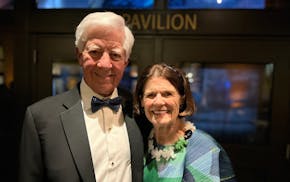If you want to sit around griping about the state of the world, don't do it at a meeting of the St. Paul Optimist Club. They don't call themselves "optimists" for nothing.
The club members are "people who want to share the attitude of optimism," said Margie Bodas, a member and one of the club's many past presidents. "You need optimism or nothing will get done. If you don't have optimism, you kind of just stagnate."
The Optimist Club of St. Paul, one of nearly two dozen chapters in Minnesota of Optimist International, definitely has not stagnated. One of the state's oldest local groups, it celebrates its 100th anniversary this month.
At a gala the club held a few weeks ago, a couple of dozen past presidents attended. The club has had a different president every year throughout that century, Bodas said, with the exception of a year during COVID-19. Also attending were young people who've received scholarships from the club, one of its most important projects.
But underlying their array of community volunteering projects, the Optimists emphasize the importance of maintaining a positive outlook. It's even written into the club's official creed, which asks members to commit to a list of upbeat promises, such as "Look at the sunny side of everything and make your optimism come true," and "Wear a cheerful countenance at all times and give every living creature you meet a smile."
The strong emphasis on optimism subtly distinguishes the Optimists from other community service organizations, said Diane Koch, another member. Not that members of other groups are pessimistic, but if the Lions are known for recycling eyeglasses and Rotary places more focus on local economic growth, the Optimists are all about being hopeful for the future.
"Optimism isn't necessarily that you're walking around giddy and smiling," said Koch, who sometimes plucks a tenet from the creed to put at the end of an email. "It's an attitude that 'This too will pass. We'll get through it.'"
And the Optimist Club should know, having made it through the Great Depression and Dust Bowl era in the 1930s, World War II the following decade, the arms race in the decades after that, and assorted assassinations, protests and economic ups and downs over the years.
Most current members don't remember the early decades. But they may find it comforting to remember that the nation has faced challenges at least as potentially worrisome as conflicts going on today.
In fact, it's the club's ability to rise above such conflicts that Bodas likes most about being a member. Unlike in many social situations, she gets an opportunity to meet people whose politics may differ, and engage in a shared passion for helping youth.
For instance, club members get together monthly to cook a meal for members of the Jeremiah Program, an organization that supports single mothers and their children.
"If you start with your differences you're not going to get far," Bodas said.
Club members don't spend much time debating differences of opinion, "but they're there and we all know who thinks what," she said. "And we still find things that we share together that are important to us. Neither of us is going to be able to change the other person. We are able to talk about it and still get together and do stuff. I just think that's something pretty special these days."
Optimist Club members tend to skew middle-aged or older, most ranging from 40 to 80 but with a few members in their 20s and 30s (daytime meetings can be a hurdle for people with jobs and kids at home). There's some ethnic diversity, Bodas said. Socioeconomically, most members are in the middle-class-and-up brackets.
Beyond that, though, they include "real-estate people, morticians, construction people," said Karl Olson of Minneapolis, who has been in the club for 48 years. (There was a Minneapolis group previously, but it's no longer operating.)
"My insurance agent was in the original chartered club and said 'Karl, you'd be a real good person to be in Optimist Club," said the 81-year-old Olson, who retired from 3M in 2004 and became a wine representative.
"So I went to a meeting. … It was the best decision I ever made," Olson said. "I wanted to work with children."
Through the club, Olson volunteered in a program at a St. Paul high school for students who'd been missing class, and a different project involving kids in recovery.
"We'd go there once a month and have pizza with these kids. We were role models, we'd play board games, play cards, once in a while go cross-country skiing or take them on hay ride," he said.
For 30 years the St. Paul Optimists have operated a Youth Appreciation program that this year provided $3,000 post-high-school scholarships for 15 students who'd overcome some substantial challenge and have plans for continuing their education.
"A lot of these kids are immigrants, the first in their family" to pursue education past high school. "It could be culinary school, it could be a trade school, it could be Macalester College, could be anything," Olson said.
Many volunteer projects struggle to find participants who can make a long-term commitment; people's schedules are busy and many would prefer a one off. One advantage of the Optimist Club is that it lets members pitch in on volunteer opportunities as their schedules permit, without requiring long-term commitments by individuals.
"Let's say you want to do bell-ringing for Salvation Army; that's a four-hour commitment," Olson said. "We meet with the Jeremiah Program every month. You can go whenever your schedule's free. 'You always have enough people that you don't have to say, 'Yeah I'm going to do that for the next year.'"
And members do sincerely want to find ways to help their communities. That's what has kept the club going for its first 100 years, Bodas said.
"There's just such a similarity in belief that you can do something," she said. "There are just so many shared values that keep us together."

Minneapolis native Evren Ozel advances to finals of Van Cliburn International Piano Competition

How many of Minneapolis' new 'Purple Path' sidewalk signs for Prince fans can you find?
![Pepe Willie stood for a portrait outside the Capri Theater, which is undergoing a major renovation, in Minneapolis. ] Shari L. Gross • shari.gross@s](https://arc.stimg.co/startribunemedia/4TPIVGPZLESDCIL3ZJ4J4T4ZDU.jpg?h=91&w=145&fit=crop&bg=999&crop=faces)
Pepé Willie, mentor to Prince and Morris Day, dies at 76

Your ultimate guide to eating and drinking in downtown St. Paul

